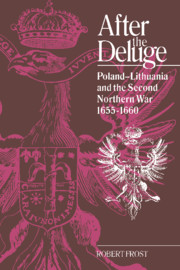Book contents
- Frontmatter
- Contents
- Preface
- Gazeteer
- Glossary
- Office holders
- List of abbreviations
- Pronunciation guide
- Genealogical tables
- Maps
- 1 Introduction: Poland—Lithuania in the midseventeenth century
- 2 The Deluge
- 3 Recovery: July 1655-August 1656
- 4 The widening conflict: June-December 1656
- 5 Constructing a coalition: January-December 1657
- 6 The succession and the failure of the coalition: January—July 1658
- 7 Political reform
- 8 Towards a French candidature: 1658–1660
- 9 Conclusion: the succession and the failure of reform
- Bibliography
- Index
- CAMBRIDGE STUDIES IN EARLY MODERN HISTORY
4 - The widening conflict: June-December 1656
Published online by Cambridge University Press: 04 November 2009
- Frontmatter
- Contents
- Preface
- Gazeteer
- Glossary
- Office holders
- List of abbreviations
- Pronunciation guide
- Genealogical tables
- Maps
- 1 Introduction: Poland—Lithuania in the midseventeenth century
- 2 The Deluge
- 3 Recovery: July 1655-August 1656
- 4 The widening conflict: June-December 1656
- 5 Constructing a coalition: January-December 1657
- 6 The succession and the failure of the coalition: January—July 1658
- 7 Political reform
- 8 Towards a French candidature: 1658–1660
- 9 Conclusion: the succession and the failure of reform
- Bibliography
- Index
- CAMBRIDGE STUDIES IN EARLY MODERN HISTORY
Summary
The second half of 1656 was marked by increased foreign interest in the Polish-Swedish war. French concern was growing at the involvement of Sweden, their most important ally in Germany and the Baltic. Mazarin wished Charles X to play a more active part in imperial politics as an election loomed, and he feared that the Austrian Habsburgs would intensify support for Spain while Sweden was distracted. In the summer of 1656, Antoine de Lumbres was sent to Poland to persuade John Casimir to settle with Sweden; meanwhile d'Avaugour, the French ambassador to Sweden, sought to moderate Charles's demands. De Lumbres was given a frosty reception when he arrived in Warsaw on the eve of the battle; nevertheless, John Casimir told Vidoni that there was a feeling Charles might prove conciliatory and be content with a few Prussian towns, although the attitude of Andrzej Leszczyński and Trzebicki did not lead the nuncio to suppose that the idea had much chance of success.
Some, however, were prepared to listen: de Lumbres suggested that Poland should cede Samogitia to Sweden in exchange for Prussia, which, he reported, was not badly received in some quarters. Immediately after the battle, Charles offered an agreement in order to turn on the Muscovites.
- Type
- Chapter
- Information
- After the DelugePoland-Lithuania and the Second Northern War, 1655–1660, pp. 71 - 85Publisher: Cambridge University PressPrint publication year: 1993

